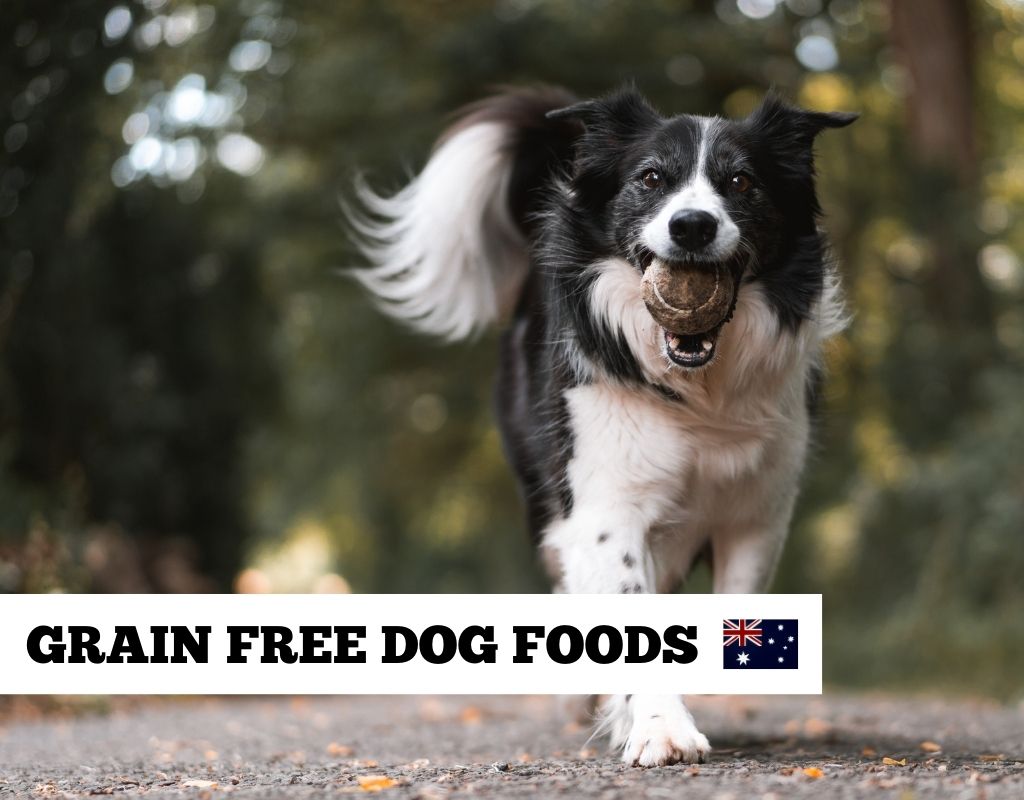
Before I recommend grain free dog foods I want to make sure you know why these may be better for your dog. The reason I say that is (in a nice way) it may not be the reason you think.
In my many years involvement with the pet food industry I can confidently say this – grain free dog foods are usually better than grain-based dog foods.
In fact, some grain-based dog foods are terribly unhealthy for your dog. Dog foods most Australians feed their dogs.
But…
If you want the best for your dog it isn’t really about grain or grain-free. That’s just marketing. Your dog will benefit far more from meat and other animal ingredients, rather than what else is in their food.
When choosing a grain free dog food you want two things – (1) an emphasis on meat, and (2) a balance of decent ingredients.
Let’s take a look:
- Grain free dog food recommendations (if you’re short on time)
- A complete list of grain free dog food (in Australia)
- Is grain free better for dogs?
- What are the pros and cons of grain free dog foods?
- Do dogs need grain in their food?
- Why do vets not like grain free food?
- What dog breeds should not have grain free dog food?
- Does your dog have a grain sensitivity? Itchy skin, scratching, rashes?
- Advice on how to choose a grain free dog food
- Further questions about grain free dog food
Grain free dog food recommendations (if you’re short on time)
I encourage you to read the ins and outs of grain free dog food below, but if your time is on a budget then here’s some top picks based on your other budget – money:
Budget friendly: Taste of the Wild
Yes, it’s an American brand and yada yada yada, but the benefit of Taste of the Wild is there are thousands of happy dog owners worldwide who’ve had success on this brand. It’s also, of course, totally grain free.
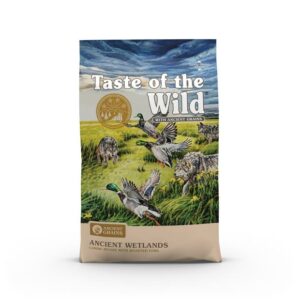
Taste of the Wild will suit most dogs, and importantly suit an affordable budget. You’ll find dry dog foods with more meat (cough, Orijen and ACANA), but as meat ingredients cost the manufacturer more, they’ll also cost you more.
Taste of the Wild is a great grain-free dog food which won’t break the bank, and it’s a safe bet.
However, there’s a caveat – if you’re currently feeding a supermarket grain-based dog food you may be appalled at the cost, but it makes a lot of sense when you read the ingredients of that dog food and find it’s mostly cereals (or some kind of cereal by-product).
Truth is it costs more to feed a dog properly than you may think, and Taste of the Wild is definitely on the more affordable side.
Related: Taste of the Wild dog food review.
Also budget friendly: Petzyo (Aussie dog food to order)
Petzyo is one of the coolest Aussie dog food companies, and their grain free dry food and BARF patties (also grain free) make an excellent combination.
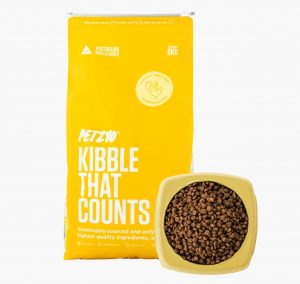
Petzyo work on a subscription delivered-to-your-door method which may suit you to a tee, and they’re a great company to deal with.
You won’t find Petzyo stocked at retailers, but you can order direct here (with 10% off).
Mid-range and Aussie: Healthy Everyday Pets
I said your dog needs meat, right? Healthy Everyday Pets is both grain free AND has a very strong focus on meat. Paleo, if you will.
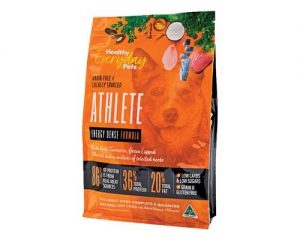
Healthy Everyday Pets is the brain-child of Superman’s personal trainer (I kid you not!) and his nutritionist chef and author-on-health-food wife who knows all about the right nutrition. Michael Ryan and Zoe Bingley-Pullin.
Before Healthy Everyday Pets was released most pet food manufacturers would say “you can’t have that much meat in a kibble, it would fall apart”. How wrong they were.
When you look at the Athlete formula, which probably suits your dog regardless of age, breed, or size, you’ll find it to be one of the highest meat-content grain free dog foods available in Australia today. Best of all, it’s priced in the mid-range.
36% protein and 20% fat is astounding. Really low carbs which your dog doesn’t need.
Related: Healthy Everyday Pets dog food review
Top end superior nutrition: Frontier Pets, Eureka, Lyka, Proudi, and Big Dog
Quite a 3rd recommendation I know, but when it comes to top-tier dog foods you have options (and money to back them). Truth is they’re not as costly as you may think, especially when you factor in the health of your dog and hopefully saving on vets bills in later years.
I’ve fed all these foods to my dogs (and cantankerous cat) over the years, and they go further than you would think. Admittedly I feed a variety, often including dry food and fresh food, which makes these top end foods last longer (and save me less guilt).
I’ll give a summary with links to the reviews, so you can decide if they’re right for you:
- Frontier Pets – A wonderful and ethical Australian company, with amazing feedback from Aussie dog owners over the years. As a freeze-dried grain free (raw) dog food it lasts for ages, and it’s top quality.
- Lyka – A fresh slightly-cooked delivered to your door option, essentially a Hello Fresh for dogs. I know I recommend these guys a lot (and Frontier Pets above), but feedback has been excellent.
- Eureka – Another Aussie brand I’ve come to have a great deal of respect for. Eureka are the Australian equivalent of ZIWI Peak, so if you’ve heard of how legendary ZIWI are then Eureka are on par, and Australian! They work on a subscription method which takes a bit of work to sign up for, but it’s worth it.
- Proudi – We’re talking BARF patties here, which are not only grain free but grain-free free as well. These are true to nature carnivore raw food patties. They used to be heart-shaped which was great, but they’ve cut that lovey dovey nonsense as your dog doesn’t care about it.
- Big Dog – The original Aussie BARF patty if you forget about Dr B’s BARF (which I don’t find anywhere near as good these days), Big Dog is also grain free, true to form raw dog food, with some beneficial fruits, veggies, and herbs.
Out of the above five, the top three you’ll need to order direct from their websites (so basically you cut out the middle-man retailer), and Proudi and Big Dog are found at most pet stores.
If you can’t afford these top brands, then they’re worth considering as dog food toppers or as part of the diet combined with a decent kibble.
A complete list of grain free dog food (in Australia)
If you’re interested in a grain free dog food not mentioned above, then hopefully it will be covered by one of the below reviews:
- A La Carte Grain Free Dog Food Review
- Absolute Holistic Dog Food Review
- ACANA Dog Food Review
- ALDI Natural Elements Dog Food Review
- Applaws Dog Food Review
- Balanced Life Dog Food Review
- Balanced Life Enhanced Dog Food Review
- Be Frank Dog Food Review
- Billy + Margot Dog Food Review
- BIOpet Dog Food Review
- Bugsy Dog Food Review
- Canidae PURE Dog Food Review
- Earthborn Holistic Grain Free Dog Food Review
- Freeze Dry Australia 100% Raw Dog Food Review
- Frontier Pets Dog Food Review
- Holistic Select Grain Free Dog Food Review
- Hypro Premium Dog Food Review
- Ivory Coat Grain Free Dog Food Review
- K9 Natural Dog Food Review
- Kirkland Signature Nature’s Domain Dog Food Review
- Kiwi Kitchens Dog Food Review
- Leaps & Bounds Grain Free Dog Food Review
- LifeWise BIOTIC Dog Food Review
- LifeWise Dog Food Review
- Man’s Best Dog Food Review
- Meals for Mutts Grain Free Dog Food Review
- Nature’s Goodness Dog Food Review
- Nood Dog Food Review
- Nutra Gold Dog Food Review
- Nutro Wild Frontier Dog Food Review
- Optimum Grain Free Dog Food Review
- Orijen Dog Food Review
- Performadog Dog Food Review
- Pet Food Australia Dog Food Review
- Petzyo Dog Food Review
- Phoenix Dog Food Review
- Prime100 SPD ZeroG Dog Food Review
- Pro Pac Ultimates Dog Food Review
- Providore Dog Food Review
- Pure Life Dog Food Review
- SavourLife Dog Food Review
- Scratch Dog Food Review
- Stay Loyal Dog Food Review
- Stockman & Paddock Dog Food Review
- Supercoat Grain Free Dog Food Review
- Talentail Dog Food Review
- Taste of the Wild Dog Food Review
- Taste of the Wild PREY Dog Food Review
- Vetalogica Dog Food Review
- Vetalogica Naturals Dog Food Review
- Wellness CORE Dog Food Review
- Whole Hearted Dog Food Review
- Woof Dog Food Review
- Zealandia Dog Food Review
- Zignature Dog Food Review
- ZIWI Peak Dog Food Review
Do you feed one of the above grain free dog foods? Let me know your thoughts in the comments below.
Is grain free better for dogs?
We live in a world of misinformation, most of it sadly missing the point.
For many years grain free dog food began to have an upper hand on traditional dog foods made mostly of wheat. For the record I see wheat as the most problematic grain, causing all manner of health issues, itchy skin, and weight gain in dogs who are unable to efficiently digest it.
The trouble is the manufacturers making that grain-based dog “food” started to lose market share, and that didn’t wash.
In July 2018, an FDA investigation hit the media. An investigation into grain free and “boutique” dog foods causing a relatively unheard of heart condition in dogs known as Canine DCM (Canine Dilated Cardiomyopathy).
The investigation was later dropped from inconclusive findings, but not before many leading grain free dog foods were “named and shamed”, and even today I see people post “grain free dog foods cause heart failure – FACT!” from people who are really just parroting what they’ve heard from other parrots.
If you want further verification that I’m right and they’re wrong, then consider these two facts – (1) Dr Lisa Freeman who instigated the investigation has been on the payroll of most global pet food manufacturers selling grain-based dog food, and (2) the two leading grain-free “boutique” dog foods who suffered the most damage from saga, ACANA and Orijen, have now been bought by one of those leading pet food manufacturers – Mars Petcare.
So, is grain free better for dogs?
My answer is, no, meat is better for dogs.
Whether a dog food is packed with grains or grain-free substitutes like potato, sweet potato, or tapioca is not the point.
The point is how much meat has been sacrificed to make the dog food “affordable” or to make the highest profit.
You’re much better off choosing a dog food based on meat content as the first priority, and secondary to that a decent range of back-up ingredients. These can be a decent selection of non-meat ingredients, whether grain or grain-free.
I consider better grains, like oats, barley, and to some extent brown rice, okay in moderation. They have nutritional merit after all.
But only in moderation.
The same goes for potatoes, tapioca, peas, and other legumes. Your dog can benefit from many of these ingredients, as long as your primary focus is on meat (including offal and bones if you can).
If you feel at this point you’re confused about what to feed your dog, spend a few bucks on the amazing book Work Wonders by my friend and highly-experienced Australian vet Dr Tom Lonsdale.
What are the pros and cons of grain free dog foods?
Considering the above information on whether grain free is better for dogs, we can make a pragmatic evaluation of the pros and cons of grain free dog food.
Pros
- Ingredients of grain free dog foods are often better than grain-based dog foods. But you generally pay more.
- Grain free dog foods tend to work better for dogs with dietary sensitivities, allergies, and intolerances. But, I find most of these issues caused by grain-based dog foods made of wheat, cereals, and artificial colours and/or preservatives rather than other grains.
- Depending on the selection of ingredients, particularly the non-meat grain-free inclusions, a grain free dog food should have better digestibility.
- Where many grain-based dog foods have a significant amount of one type of grain (or grain by-product), in general most grain free dog foods have a more balanced set of ingredients, such as peas, potatoes, lentils, and so forth.
Cons
- Whether grain or grain free, this can mean a lack of meat proteins and fats.
- A grain free dog food is only worth more money if the ingredients are balanced and they have an adequate meat/animal fat content.
- Both grain or grain-free formulas can be high carbohydrate, which is not ideal for your dog.
- Grain free dog foods will often cost more than a grain based dog food, and feeding dogs can be expensive.
- A dog who is used to grain-based dog foods may not take to a grain free dog food (although incentives like dog food toppers may help).
Do dogs need grain in their food?
Thousands of raw feeders will tell you no, dogs do not need grain in their foods. Even the argument a dog in the wild would eat the stomach contents of prey, inclusive of grains, holds little merit – in fact most wild carnivores eat everything except the stomach contents of prey.
There are many very healthy raw fed dogs who do not have grain in their diet, and many of them have outlived their grain-fed counterparts.
However, many grains provide essential nutrients including protein, fats, and mineral. Fibre in grains can play a part in keeping your dog’s digestive system functioning correctly. There’s been a great deal of research in these areas (because pet food manufacturers love to back-up their ingredients with scientific research).
The real consideration is moderation.
I find the question is rarely “How much [grain] should you feed a dog for it to be beneficial”, instead being “How much [grain] can be fed to a dog to maximise profit”. The latter, sadly, is the driving factor behind products, and dog food is a product.
I’m sure this is the reason we’ve had Australian dog foods being almost entirely formulated from corn. One good example is Advance Dermocare, subsequently reinvented by manufacturer Mars after it was linked to the deaths of numerous Australian dogs. Some that survived still suffer from the heartbreaking condition megaesophagus to this day, in which they struggle to swallow food.
That food, until that point, had the religiously loyal backing of breeders and veterinarians, some of whom wrote to me personally to say “how dare I”, without any consideration if corn was a good thing to feed meat-loving dogs.
I’m confident in my opinion dogs do not need grain in their diet, but this doesn’t mean they need grain-free substitutes either.
If your dog food has some grains, or some grain-free ingredients, then don’t consider it an issue, as long as it’s in a beneficial moderation.
Why do vets not like grain free food?
Many vets will not recommend grain free dog foods, but note many other veterinarians see no issue with grain free or other forms of feeding such as raw.
It seems many veterinarians to this day are adamant grain free dog foods cause heart failure, but if you really question them you will find it’s what they’ve been told. More on this saga here.
Some Australian veterinarians actively promote raw feeding, including Dr Ian Billinghurst (inventor of BARF) and Dr Tom Lonsdale of Raw Meaty Bone fame (who has also played a key part in raising awareness of, what he refers to, as the “junk pet food industry”).
Raw feeding, by definition, is “grain free dog food”.
Dr Lonsdale has raised a great deal of evidence on how the pet food industry sponsors veterinary studies, many seasoned vets will remember being taught about specific prescription brands, sometimes from lecturers on the payroll of the pet food manufacturers themselves.
Wool. Eyes.
Veterinarians are wonderful people who love pets and work incredibly hard, but keep in mind they’re trained to be pet “doctors” rather than pet “nutritionists”. Thankfully most modern vets offer good advice with dog food, and I encourage you to speak with them about the needs of your dog.
I have written more at length on why vets recommend brands such as Hill’s and Royal Canin, which I see largely as indoctrination (sounds radical, right?), but also because they see these brands have a positive effect on the health of dogs suffering various conditions.
However, what I find rarely considered is what a dog was being fed when the health condition developed, and whether the prescription dog food made of grains is really that much better than the grains in the previous dog food. You could assume rice is better for a dog than wheat husks, couldn’t you?
But is rice better than meat?
Admittedly, if your dog gets sick, one of those expensive vet-recommended prescription diets may help, but it’s worth considering why your dog became sick in the first place (if it was diet-related), and also what other options might be.
If your vet recommends against grain free dog foods, ask why. If they state “FDA investigation”, then note that investigation was dropped, and also note Dr Lisa Freeman who kicked off the investigation was being paid by the same companies who make the grain-based vet-recommended dog foods.
What dog breeds should not have grain free dog food?
Keep in mind the key point discussed earlier, which is the necessity of animal ingredients in a dog’s diet, whatever breed.
When you consider breed-specific formulas, such as those from Royal Canin, these are tailored to support the health concerns of specific breeds. When it comes to concerns with grain free dog foods, the breeds considered most at risk are Great Danes, Doberman Pinschers, Newfoundlands, Irish Wolfhounds, Saint Bernards, Boxers, and Cocker Spaniels.
These breeds are more at risk of heart conditions such as DCM, which means lack of animal ingredients more a concern.
The reason why specifically-formulated grain-based foods may have less risk in this respect isn’t so much about the majority of the formula, but the smaller inclusions to support such conditions. It doesn’t mean the bulk of the formula (i.e. the grain part) is better than an alternative grain free dog food.
My recommendation is if the breed of your dog has a pre-disposition to any health condition, including DCM, then consider tailoring their diet in that respect. This may be dog food with a better emphasis on meat, grain or grain free, or supplemental feeding of fresh, raw, BARF, or specifically designed supplements or toppers.
I also encourage you to seek advice from your veterinarian.
Does your dog have a grain sensitivity? Itchy skin, scratching, rashes?
Too often a dog will be diagnosed with a “chicken allergy” at the slightest rash or ear infection, as if it’s the default in dietary sensitivities.
Over many years I’ve found wheat, cereals, cereal by-products, artificial preservatives, antioxidants, and colours in cheap dog foods to be the more likely cause, and you should too.
Most of the time the diagnosis of “chicken allergy” results in a switch to a hypoallergenic dog food without chicken, but without any of the above ingredients either.
As a dog owner you’ll be grateful your dog is no longer itchy and their health is better, but you’ll remain locked in to an expensive prescription diet (probably made mostly from rice) from now on. Most dog foods, grain or grain free, contain chicken. Even if it’s just as “animal fat” on the ingredients.
If your dog shows signs of food sensitivities, or if your vet has diagnosed the default of “chicken allergy” without any real consideration on tests, then I encourage you to figure out if your dog has a sensitivity to wheat, cereal grains, or artificial additives.
If this is the case, a simple switch to a grain free dog food (or even a better quality grain-based dog food) may fix all your dog’s problems.
Related: Hypoallergenic dog foods | Limited ingredient dog foods (without chicken)
Advice on how to choose a grain free dog food
As with grain-based dog foods, grain free dog foods can vary in quality. Substituting cereal by-products for potato skins, as an example, will mean a product can be labelled grain free, but it doesn’t mean it’s nutritious.
Whether opting for a grain-based diet or grain free for your dog, always opt for a product which has a significant amount of protein and fat from meat ingredients.
Grain isn’t bad for a dog as long as the grain is nutritious, and not fed in excess. Wheat is a grain which should always be avoided as may cause health to deteriorate, cause bloat, lethargy, and allergies. When we see “Cereals”, or worse, “Cereal By-Products” in a dog food, we can assume this will be wheat, wheat by-products, and possible other grains.
If your dog does not suffer from grain allergies (or sensitivities), then there is no reason you shouldn’t feed a grain-based food over a grain free dog food. You could always feed a variety of both. Just avoid feeding your dog an excess of grain or grain free ingredients over meat ingredients.
Further questions about grain free dog food
What is grain free dog food?
Historically most kibble was grain-based. The Australian Standard for Manufacturing and marketing as pet food specifically states “Dry pet food products are typically cereal based”, but this doesn’t mean it’s right for your dog. As awareness grew of kibble being formulated significantly of grain, it gave rise to smaller “boutique” manufacturers creating grain free dog foods. Traditional dry dog food recipes utilised grain as a significant ingredient and binder. As consumer concern increased about the nutritional aspects of grain, pet food manufacturers opted for grain free alternatives. Most grain free formulas opt for alternative starches such as potato or tapioca, as well as ingredients considered better for digestibility such as legumes.
Is grain free dog food better than grain dog food?
In general grain free dog foods are a higher quality but may also cost more. Most dog foods at the cheaper end of the scale utilise grains with questionable nutritional value for a canine, whereas more expensive grain free dog foods offer a better balance of nutrition while still favouring non-animal ingredients to keep the product affordable.
What ingredients are used in grain-free dog foods?
All dog foods should have a suitable amount of animal ingredients including protein and fat. Grain free dog foods will typically include vegetables ingredients (such as potato, sweet potato, or squash), and often legumes. In Australia, peas and chickpeas are commonly found in grain free dog foods, adding protein, carbohydrates, and fibre.
Are there any risks associated with feeding my dog a grain free dog food?
An important consideration is no dog food can be perfect, whether grain or grain free. Most dog owners feed a single product, which means a complete reliance on the product fulling the complex nutritional needs of the animal. If any nutrients are missing, this could lead to long term health issues. A good example of this is the previous belief taurine was not required in a dog’s diet, which more recent research has shown to be untrue. As taurine is sourced mainly from animal ingredients, this meant a dog food, grain or grain free, could lead to taurine deficiency in dogs. Canine DCM is one such example.

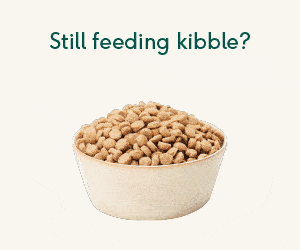


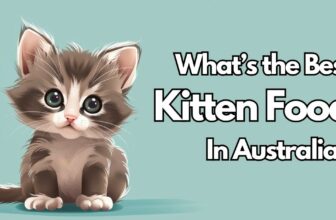

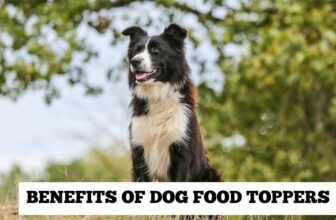
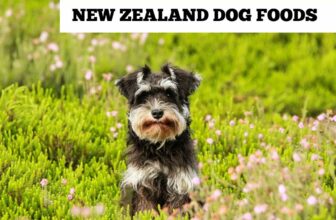
Legumes, lentils and potatoes are NOT always the best
Especially when your dog is allergic to them and every single food has either one legume, lentil or potato in it
Grain based foods for dogs are NOT the only source of allergies
As my dog and May other dogs have proven they can be allergic to any type of food
Not only grains
How about dog food companies stop packing foods with legumes, lentils and potatoes because people like you say grains are allergens to dogs
I’m for one that grain based foods are much better then these grain free types
My dog brakes out in hotspots all over his body if he eats any food with legumes, lentils or potato’s
So stop slagging grain based foods as not every dog can have grain free food and it’s not always the best for them
What is a good dog food that has low legumes and low grains but with balanced nutrition? My dogs are getting sensitive to high pea-content foods which are giving them bouts of diarrhea.